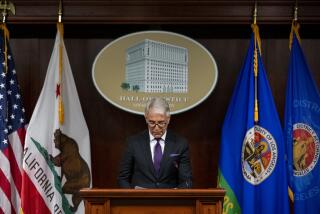Software’s Symantec Weathers Stormy Seas : Technology: A suit and criminal investigation related to hiring a manager from a rival are the latest problems.
- Share via
For Gordon Eubanks, the former nuclear submarine officer who is chairman and chief executive of Symantec Corp., it’s been a rapid reversal of fortune.
Just a few months ago, Symantec was one of the computer software industry’s hottest properties, known for an ambitious acquisition strategy (including the 1990 buyout of Santa Monica-based Peter Norton Computing) and a strong record of growth.
Eubanks was winning praise from Wall Street for his stern, hard-driving management style. Symantec’s stock traded near $40 a share through most of June--close to its all-time high. And the company got a lift when Apple Computer signed a deal to use a new Symantec software-writing technology to develop its own products.
But things started to unravel in July. Symantec released a disappointing earnings report, sending its stock down. The company laid off 10% of its work force--about 100 people--amid signs that some of its far-flung products were struggling.
In September, the company hired Eugene Wang, a senior executive at rival Borland International. But what might have been a Symantec coup soon grew into a nightmare when Borland filed a civil suit and a criminal complaint accusing Eubanks and Wang of stealing trade secrets.
On Sept. 2, Santa Cruz County investigators armed with search warrants arrived at Eubanks’ two homes, Wang’s home and Symantec’s offices, and seized portable computers, files and other items. Authorities say that a trade secrets investigation is underway, but say they have not yet decided whether to file criminal charges.
The case has been a hot item on the Silicon Valley gossip circuit for weeks. Not only does it involve two prominent personalities in the close-knit personal computer business--Eubanks and Borland International Chairman Philippe Kahn--but it also raises questions about the Valley’s rampant job-hopping and the sensitive issue of intellectual property protection.
“It’s not rare at all for employees to leave one company and go to another,” says Dan Kaufman, an attorney with the San Francisco law firm Brobeck, Phleger & Harrison, which is not involved in the case. But the naming of a prominent company official, such as Eubanks, in a lawsuit over such a defection is unusual, he says. And the filing of criminal, rather than civil charges, is “a big deal,” he adds. Clearly, the combination of legal and business problems adds up to a major test for Symantec’s management. Analysts speculate that Symantec would be forced to fire Eubanks if criminal charges are filed.
Symantec officials insist that the case will ultimately amount to “a tempest in a teapot.” Even if it does, Eubanks will find it difficult to restore the company’s image and re-energize its stock, which closed Friday at $10.50.
“It’s a company that historically has executed well,” says PaulJohnson, an analyst at First Boston. “This will be the test of the management, to see if they’re really as good as they think they are.”
Eubanks says he’s trying to keep things in perspective. “It’s inappropriate to think you have a God-given right for everything to go right all the time,” he said. “The competitive pressures and the dynamics of the market are something that you have to live with.”
Eubanks won’t discuss the specifics of the Borland lawsuit. But he says it hasn’t affected his ability to run the company. “I’m spending an hour a day (on it), maybe less,” he says. “Life goes on. You can’t let something like this drive your life.”
The brawl with Borland began Sept. 1, when Symantec announced that it had hired Wang as a vice president in charge of its language and productivity products.
Wang, disappointed after a management shuffle two months earlier, resigned from Borland that same day. Acting on a tip, Borland officials searched records of electronic messages that Wang had sent via MCI Mail. They found 10 messages he had sent to Eubanks and others that allegedly contained proprietary information on Borland’s product plans.
Normally, that might lead to a civil suit. Such actions have become relatively common in an industry where the expertise of a few people is often a company’s key asset.
But Borland took matters a step further, filing a criminal complaint with the Scotts Valley Police Department in addition to a civil suit. Police say they found the information in the messages sufficient grounds to seek a search warrant.
The case took another bizarre twist when Borland accused Wang’s secretary--who had also left for Symantec--of attempting to take additional information when she visited Borland to clean out her desk.
The Santa Cruz County district attorney’s office has said little about the investigation.
Legal experts who aren’t involved in the case don’t know what to make of it.
“At first blush, it seems like they (Borland) must have had some pretty good evidence,” said Kaufman of Brobeck, Phleger. “But it’s bizarre--Wang, a premier computer scientist, doesn’t know that when you use MCI mail, it’s recorded? It’s a very strange set of facts.”
Some of Eubanks’ friends and acquaintances say they doubt that he would deliberately steal trade secrets. Within the industry he is regarded as an intelligent, no-nonsense executive who combines strong technical knowledge with rigorous financial management.
In the meantime, he has his hands full with more mundane matters. Founded just 10 years ago, Symantec has become a power in PC software largely through well-executed acquisitions, including the 1990 buyout of Peter Norton Computing for $70 million in stock.
It is the world leader in so-called utility programs, which help PCs perform housekeeping tasks, such as automatically creating backup copies of files and eliminating computer viruses. The Santa Monica-based utilities business employs about 300, and Symantec has other divisions that supply computer languages, databases and project management software.
But the company has stumbled in the wake of changes wrought by Microsoft’s Windows software, a popular enhancement to DOS, the basic operating software on a personal computer. “The DOS business is slowing down, and the Windows business is not picking up enough to take up the slack” in the short term, acknowledged Rod Turner, executive vice president in charge of the utilities group.
Some analysts fear that the market for PC utility software eventually will drop off as the market becomes saturated and utility functions are absorbed into new versions of DOS. Turner says similar predictions have proven wrong in the past.
Still, many believe that Symantec has a strong technology base, and they’re especially optimistic about a new software language called Bedrock. The language makes it possible to create versions of a software program for IBM-compatible PCs and Apple Macintoshes at the same time.
For his part, Eubanks expresses confidence that his company can successfully navigate both the Borland lawsuit and the treacherous competition in the PC software business. “This is a very dynamic business . . . ,” he says. “We survive because we have tenacity.”






